Gerrymandering takeaways: What the Supreme Court's redistricting decision means for Wisconsin - 5 minutes read
 What the Supreme Court's decision means for Wisconsin
What the Supreme Court's decision means for WisconsinMADISON - Wisconsin's legislative maps weren't before the U.S. Supreme Court, but the court's ruling Thursday appeared certain to end a lawsuit seeking to change the Badger State's district lines.
The 5-4 decision will likely bring to an end a Wisconsin lawsuit that was set to go to trial next month and will affect which party has the upper hand in elections next year and beyond.
Here's a look at the short- and long-term implications of the rulings on Wisconsin.
Republican lawmakers drew election districts in 2011 that favor their party. They'll almost certainly be able to keep them next year in light of Thursday's ruling.
That will make it hard for Democrats to make gains in the statehouse even as they try to boost turnout for the 2020 presidential election.
Republicans control the state Senate 19-14 and the state Assembly 63-36.
RELATED: New election data highlights the ongoing impact of 2011 GOP redistricting in Wisconsin
After the 2020 census, Wisconsin and every other state will have to draw new maps to account for changes in population.
Last time, Republicans controlled all of Wisconsin government, making it easy to draw maps to their advantage. This time, Democratic Gov. Tony Evers will have a chance to try to block maps put together by Republicans.
That could mean the two parties reach a compromise on the maps or — perhaps more likely — go to court with competing sets of maps.
With the latest rulings, it's almost certain that Wisconsin's long-running lawsuit will wrap up soon in Republicans' favor. A trial that was scheduled to begin July 15 likely won't be held.
Democratic voters who brought the suit tried to get GOP Assembly Speaker Robin Vos of Rochester to sit for a deposition, but Vos persuaded judges to put off a decision on whether he had to testify until after the Supreme Court cases were decided.
In light of Thursday's ruling, Vos likely won't have to answer questions under oath.
If Wisconsin's government is split when census figures are released in 2021, another big legal fight is likely.
Republican lawmakers could try to make the argument that they don't need the governor's permission to establish new maps, even though past maps have been treated like ordinary legislation that needs the approval of lawmakers and the governor.
Whatever the legal arguments, expect Republicans to try to get the case before the state Supreme Court, where conservatives have the majority.
Democrats will want to have the case heard in federal court, where they have had initial success around the country in recent years.
Those drawing maps could get more creative, in Wisconsin and elsewhere.
With Thursday's ruling, the Supreme Court determined it's not up to courts to decide when maps are tipped too heavily to one party's advantage.
That means if one party holds the governor's office and Legislature in a year when the census is conducted, it can draw maps that give it the ability to hold the Legislature for a decade.
Mapping software makes it easy for politicians to engineer maps that give them a firm grip on the statehouse.
Some states, such as Arizona and Michigan, have given the map-drawing process to nonpartisan commissions instead of lawmakers. Chief Justice John Roberts noted this development in his majority opinion, writing that the court with Thursday's decision "does not condone excessive partisan gerrymandering."
But establishing a nonpartisan system for drawing maps in Wisconsin would require a new law or an amendment to the state constitution. Doing either would require the approval of state lawmakers, and majority Republicans have shown no interest in changing the system.
Contact Patrick Marley at patrick.marley.com. Follow him on Twitter at .
Source: Jsonline.com
Powered by NewsAPI.org
Keywords:
Judgment (law) • Madison, Wisconsin • Legislature • Supreme Court of the United States • Lawsuit • Wisconsin • Judgment (law) • Wisconsin • Lawsuit • Republicanism • Democratic Party (United States) • United States presidential election, 2020 • Republican Party (United States) • New Jersey Senate • California State Assembly • Republican Party (United States) • Redistricting • Wisconsin • 2020 United States Census • Wisconsin • Republican Party (United States) • Wisconsin • Democratic Party (United States) • Tony Evers • Republican Party (United States) • Wisconsin • Lawsuit • Republican Party (United States) • Democratic Party (United States) • Lawsuit • Republican Party (United States) • Speaker (politics) • Robin Vos • Rochester, New York • Deposition (law) • Judge • Precedent • Supreme Court of the United States • Oath • Wisconsin • Government • Census • Republican Party (United States) • Legislation • Legislator • Law • Argument • Republican Party (United States) • Case law • State supreme court • Conservatism • Democratic Party (United States) • Case law • Federal judiciary of the United States • Social status • Nation state • Wisconsin • Ruling class • Supreme Court of the United States • Census • Map • Arizona • Michigan • Nonpartisanism • Contract • John Roberts • Economic development • Majoritarianism • Court • Case law • Political party • Gerrymandering • Non-partisan democracy • Wisconsin • Law • Constitutional amendment • State constitution (United States) • Majority • Republican Party (United States) • Twitter •